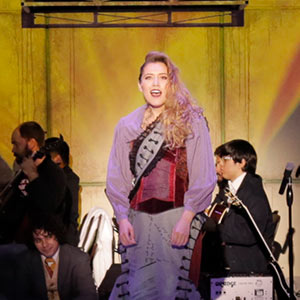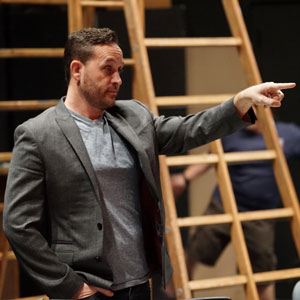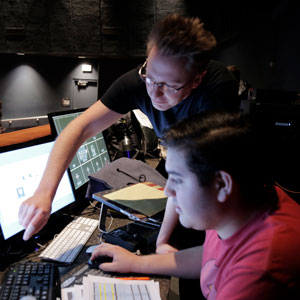Scapino has the bright stage idea
— Fullerton College Hornet - Delton Valentine - Wednesday, November 17th, 2010Fullerton College’s newest theatre production Scapino was an interesting twist of odd comedy and attempt at audience involvement.
The show directed by Chuck Ketter had a strange sense of wanting to be a decent comedy, but failed to capture the audience at large.
The play takes place in the early 1960’s at a seaport in Naples, Italy, in front a quaint cafe bar at the side of the dock.
It opens up with singing and waiters and waitresses setting the scene to open their Italian restaurant.
They all display the stereotypically Italian dialogue and attitudes.
It revolves around two sons, Ottavio and Leandro, played by Taras Wybaczynsky Jr. and Geoff Roullard, that fall in love with two women. This goes against both their fathers’ plans of an arranged marriage.
In hopes to run away with their new-found lovers, they beg one of their servants, Scapino, played by Gregory Cesena, a master of trickery and manipulation to help con their fathers into giving him money to help Ottavio and Leandro.
Scapino agrees to help but ends up complicating their dilemma with his schemes and deviousness.
Scapino, meets with the two fathers, Argante and Geronte who are played by David Anis and Theodore Lance and tells them outrageous stories about the their two boys getting into horrible situations that require money.
Once Ottavio and Leandro are given the money, they are able to reunite with their loves.
Things take a turn for the
scandalous when Zerbinetta, Leandros lone interest, tells the story of Scapino’s latest con against the two fathers to Geronte, Leandros father.
The supporting cast was good at bringing authentically funny moments to the show.
A standout of the show was the performance of Jessica Kuhns as a seductive waitress. Kuhns’ over-thetop character was not approached with an over-the-top attitude. The choice by the actress balanced out the persona used as comic relief.
One of the biggest problems with the show was the actors’ overdramatization of certain characters
and repetitive physical comedy.
Most of the show had most, if not all, of the characters continuously tripping over a rickety bridge. The gag was only amusing the fi rst fi ve times.
In fact, the show managed little laughs in between the fast-spoken dialogue. Essentially, it felt the words of the play were scarifi ced for the sake of highly stylized personas and colorful fl uorescent costumes.
The Scapino set was a memorable highlight of the night. The setting of Naples was easily felt in the crackle of the building paint and the use of a stationary boat.
As a whole experience Scapino was a comedy that made audiences laugh, however it has its deeply rooted fl aws. The verdict for this Naples odd ball comedy is “Oh, I like”.








